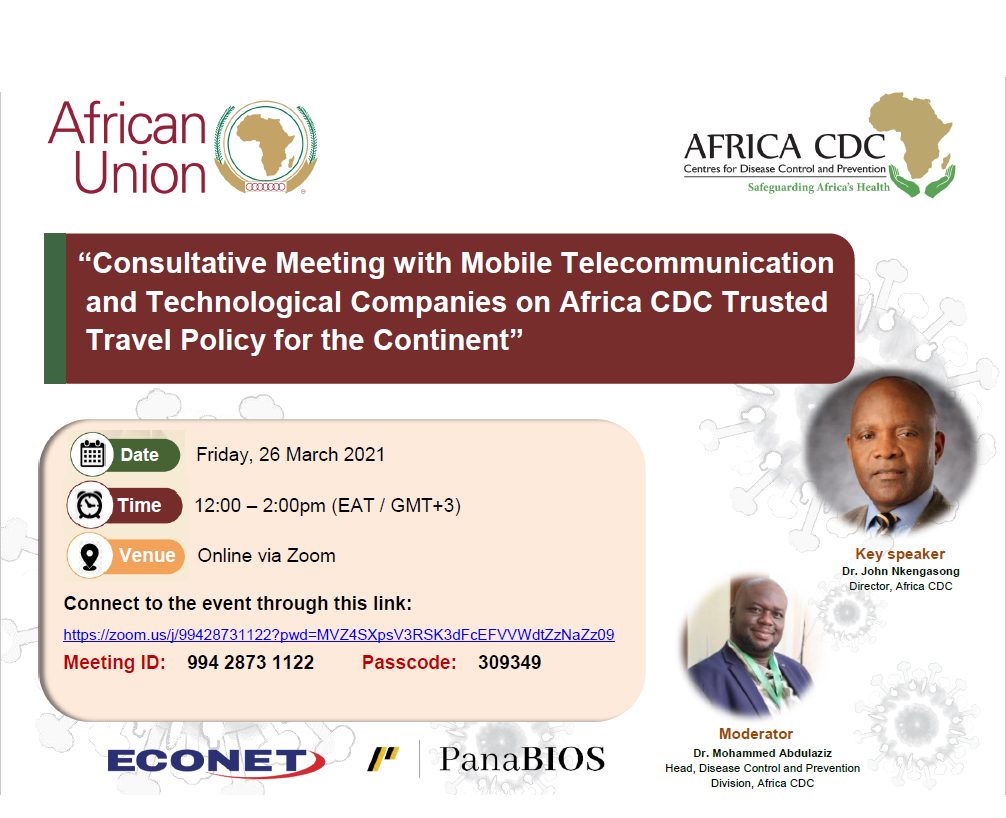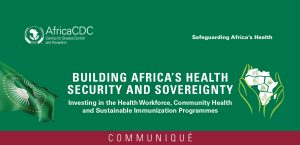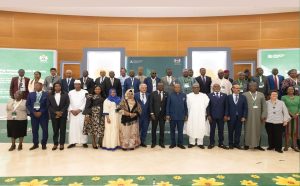Africa’s Telecom and Technology Industry Leads the Charge against COVID-19 by Backing AU Covid-Tech & Vaccine Passport System – Africa CDC obtains highly positive feedback from a consultative meeting with mobile and technology players on the Africa CDC Trusted Travel Policy.
ADDIS ABABA, ETHIOPIA, 26 March 2021 – More than a year into the global pandemic, the coronavirus disease 2019 (COVID-19) pandemic has shown that health is central to everything we do on the planet. The profound impact of the virus and of the measures which have been necessary to contain it have worsened economic inequalities and social insecurities, and deepened challenges in our already under-pressure health systems on the continent.
Lockdowns, although highly effective in the short term, cannot be a sustainable solution in the longer term given that more than 80 per cent of employment is estimated to be informal[1], and 85 per cent of the population live on less than USD 5.50 per day[2].
The Africa Against COVID-19: Saving Lives, Economies and Livelihoods campaign is part of the African Union Commission’s answer to the challenge of fighting and containing the disease, while at the same time protecting African economies and livelihoods. Launched in August 2020 and driven by the Africa Centres for Disease Control and Prevention (Africa CDC), the campaign aims to drive a “whole of society” approach to fighting COVID-19 on the continent, combining the knowledge, expertise and capacities of our public and private sector, continental and global partners, especially in the realms of innovation and technology.
A key element of the campaign is the “Trusted Travel Platform”, whichautomates cross-border verification of health certificates (whether for testing or vaccines). This platform, which went live on 2 October 2020, is an excellent example of the dual goal of preserving lives and livelihoods: By preventing the use of fake certificates, it helps manage the spread of the disease. By facilitating cross-boarder travel, it helps restore travel, tourism and trade – major pillars of our African economies.
The Trusted Travel Platform is also an excellent example of the potential of strategic collaborations between the Africa CDC and private sector technology partners. It was developed in collaboration with the AfroChampions-convened Panabios Consortium and Econet, while an algorithm co-sponsored by the United Nations development Programme (UNDP) and Koldchain has dramatically boosted the ability to screen and onboard international laboratories and transport operators to the scheme.
Indeed, because of the combined efforts of these pan-African stakeholders, two million Africans have already benefitted from Trusted Travel; lab registries in 35 countries in Africa have been digitised; and 10 airlines are currently integrating. More intriguingly, laboratories and travel operators in 17 countries in Europe and North America have enrolled through the Global Haven window for access to the Trusted Travel network.
On 26 March 2021, the Africa CDC convened key leaders to further explore how technology and innovation can and will shape the post-COVID-19 new public health order in Africa. Sixty of Africa’s leading tech and telecom executives and experts, many allied with key partners in the public and private sector, civil society and academia, explored further partnerships and collaboration across the African technology landscape to scale promising Pan-African innovation platforms like Trusted Travel. They also deliberated on how specific interventions such as the use of digital technology to boost vaccine equity and accountability in Africa and quell hesitancy can provide general blueprints for health sector transformation.
Dr. John Nkengasong, Director of the Africa CDC, said: “Whilst COVID-19 has been an undeniable tragedy of unprecedented proportions, it has also accelerated partnerships for innovation and instilled a degree of boldness that would have been unthinkable just a year ago, thus creating conditions to break the silos preventing Africa’s full potential as a global leader of innovation to be felt.”
Some key outcomes of the meeting were commitments by leading companies such as Vodacom, Safaricom, Helium Health and several others to work with the Africa CDC to design common integration points for constructing a pan-African e-health network. The Tony Blair Institute committed to an undertaking for mapping the African innovation system and the Commons Project urged the African Union to become a major participant in global efforts to define the next generation of health-tech.
In addition, the discussion highlighted key themes around ensuring that any solutions developed are suitable for the African context, and more so, that they can empower African societies and communities who have long borne the brunt of global inequities in the existing world health order, while taking into account implications on human rights, technocratic accountability, and communal ownership.
The Africa CDC, together with its partners, will continue to follow up on the individual initiatives as well as the topic in general. The tremendous potential of technology to enable a New Public Health Order for Africa will be a key topic going forward. More information on Trusted Travel is available at: www.africacdc.org/trusted-travel
For any questions, please contact:
Mohammed Abdulaziz
Coordinator, Africa CDC Trusted Travel
MohammedAb@africa-union.org
[1] https://www.bmj.com/content/371/bmj.m4704
[2] https://www.ilo.org/global/about-the-ilo/newsroom/news/WCMS_627189/lang–en/index.htm







